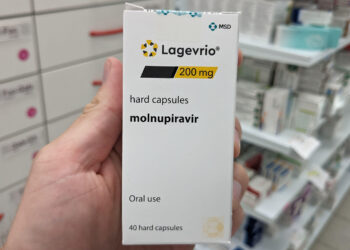The US Preventive Services Task Force (USPSTF) recommends that patients trying to lose weight should first try 6 months of behavior interventions that include a calorie-restrictive diet, weekly moderate to vigorous physical activity, self-monitoring of food intake, and removing unhealthy food triggers if possible. Yet many patients are unsuccessful at modifying their behaviors, even with regular health counseling.
In a study published last month in Nature Medicine, researchers found that patients who did just 1 month of behavior modifications instead of 6 months before starting a weight-loss medication doubled their weight loss when they added an obesity medication to the mix. The study showed that many patients who struggle to lose weight on lifestyle modifications alone could benefit from their primary care physician prescribing obesity medications earlier.

“We showed more success when we added medication early on,” said lead study author Jena Shaw Tronieri, PhD, director of Clinical Services at the Center for Weight and Eating Disorders at the Perelman School of Medicine at the University of Pennsylvania in Philadelphia.
Lifestyle Modifications Aren’t Enough for Many Patients
Whether patients add glucagon-like peptide 1 (GLP-1) medications really depends on if they’re having success with weight loss, said Tronieri. Patients wouldn’t want to add them if they were seeing success because of the potential side effects, but a large percentage of patients don’t experience clinically meaningful weight loss without the addition of medications, and those patients can be determined fairly early in the process.

“Our study showed that you can tell within a month who is going to be successful with behavior modifications and who is not,” said co-study author Thomas A. Wadden, PhD, a professor of psychology in psychiatry at the Perelman School of Medicine.
While recommendations from USPSTF still suggest that patients should continue with behavioral modifications for 6 months, this study showed that between 35% and 40% of patients aren’t going to lose significant weight within 6 months without obesity medications, said Wadden.
Behavior modifications are even more difficult because many patients don’t have the counseling shown in this study and are, therefore, trying to change their eating and lifestyle habits on their own, which can be an uphill battle. This is especially true for patients who are on the verge of a potential comorbidity like diabetes or heart disease and could turn the tide if they saw the scale tick down more rapidly.
GLP-1s Allow for a Much Higher Weight Loss
It’s important to note that this study used an older-generation obesity medication called Phentermine, a prescription medication used to lessen appetite that’s much less effective than a GLP-1 drug. The expected weight loss on Phentermine is 5% to 7%, while the expected weight loss on a GLP-1 medication is around 10% to 15%.
“You can imagine that if a GLP-1 were used for the study, it would have been even more effective than this weight loss medication,” said Ziyad Al-Aly, MD, an assistant professor in the Division of General Medicine & Geriatrics at Washington University in St. Louis School of Medicine in St. Louis.
This study tells us that if you try behavioral interventions for a month or so and it doesn’t work, then it’s most likely not going to work, said Al-Aly. For many patients, spending an extra 5 months struggling to lose weight ends up being a waste of time, he said.
David and Goliath Struggle Against the Scale
The driver for making behavioral interventions doesn’t just depend on the individual but also on their environment, including their relationships, social habits, and the food environment in which they exist, said Al-Aly.
“In our society, all of those can be headwinds against you,” he said.
While a person is trying to push with their individual willpower with behavior modifications, it’s not so easy in a country with an ultra-processed food culture, huge food portions at restaurants, long working hours, and so many people seated all day at desk jobs, said Al-Aly.
“It’s often a David and Goliath struggle, and that’s why eventually a lot of behavioral interventions fail. You’re a small factor in an ecosystem that’s constantly pushing you to consume more, to exercise less, and to drive more,” said Al-Aly.
For many Americans, GLP-1s help them to push back against the tides.

How long patients continue with behavioral modifications might also depend on their insurance coverage, said Supriya Rao, MD, director of Medical Weight Loss and clinical assistant professor at Tufts University School of Medicine in Boston.
This might not change until results from studies like this one are replicated in larger studies with GLP-1s and the recommendations from USPSTF also change, which could take time. While some insurance companies only require a BMI of 30 or higher or a BMI of 27 or higher with at least one weight-related comorbidity like diabetes or high blood pressure to cover GLP-1 drugs, “others require patients to stay on behavior modifications for a longer period of time in order for them to cover the cost of the medications,” said Rao.
Behavior modifications are an important aspect of living a healthier life on GLP-1s, but many patients have found that they’re more inspired to eat a healthy diet and to exercise once they’ve started taking the medications. A study published in the March 2024 issue of the International Journal of Obesity found that GLP-1s altered food preferences in patients, causing them to eat fewer high-fat and high-sugar foods.
Once the food noise is gone and they’re finally able to concentrate on something other than their next meal, exercise becomes easier, and so does eating healthy. “When you lose weight, it’s encouraging, so you might become more physically active. Once you’ve lost 10 or 15 pounds, you might be more excited to go to the gym and workout,” said Wadden.
It’s a positive feedback cycle for many patients, which means that just because you add the medications doesn’t mean you give up the modifications. It’s important that you do both, and these medications might make it easier to do just that.
“When you have some success, that begets more success,” said Wadden.
Source link : https://www.medscape.com/viewarticle/when-prescribe-glp-1s-earlier-might-be-better-2025a100081h?src=rss
Author :
Publish date : 2025-04-03 11:12:00
Copyright for syndicated content belongs to the linked Source.













